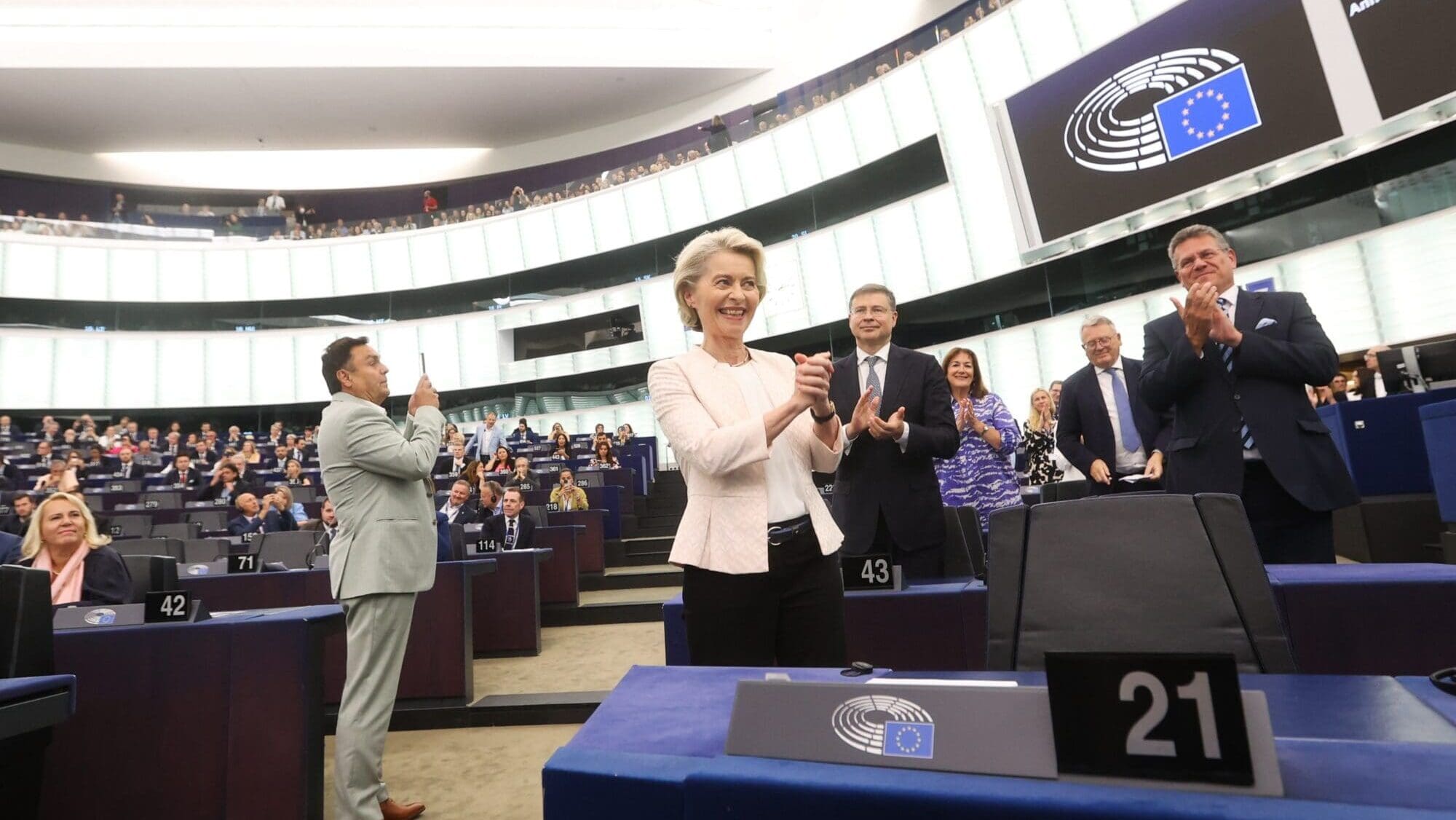
EU Commission President Ursula von der Leyen being re-elected in the Parliament’s Strasbourg plenary.
Photo: Fred MARVAUX © European Union 2024 – Source : EP
After weeks of backroom dealings in the halls of Brussels and Strasbourg, Ursula von der Leyen has been re-elected as the President of the European Commission by her center-left grand coalition on Thursday, July 18th. Despite the EU elections in June shifting the balance of power to the Right in the EU Parliament, von der Leyen’s promises to allies needed to keep her at the helm of the EU effectively pushed EU decision-making even more to the left.
The 720-seat European Parliament re-elected von der Leyen with 401 votes in favor and 284 against, with only 15 abstentions and 7 invalid ballots. With this, she surpassed the absolute majority of 361 votes needed for a second term by a majority of 40 seats. In contrast, the Commission president was elected by a razor-thin margin of only nine votes back in 2019.
The European Parliament has confirmed Ursula von der Leyen for a second term as President of the European Commission.
— European Parliament (@Europarl_EN) July 18, 2024
She will have a further five years to steer legislation at the helm of the EU’s main executive body. pic.twitter.com/5kDGd8Sppq
As the vote was done with a secret ballot, there’s no way to know for sure who voted in favor or against her second term as the head of the EU executive, but previous expectations about the ballpark numbers proved more or less correct.
Von der Leyen’s previous coalition included her centrist EPP, the social democrat S&D, and the liberal Renew. These groups still hold a nominal majority with 401 MEPs despite losing seats in June, but since statistical analysis predicted a 10-15% defection rate due to the vote being secret, von der Leyen also included the Greens by promising them continued support for the Green Deal and all its climate actions in exchange for their votes.
It turns out her strategy was needed. It is impossible that every MEP from her core coalition supported her but nobody else did, while the Greens were quite confident about voting ‘as a block’ without anyone defecting from their 53 MEPs. If that was true, this means that without the Greens’ support, von der Leyen would have been rejected by a minimum of 13 seats.
There’s also a question of how Italian PM Giorgia Meloni’s Fratelli d’Italia—the biggest delegation of the conservative ECR group—voted, as she tried to leverage her 24 seats for an influential post in the next Commission until the very last minute. But a delegation of that size would probably have given von der Leyen a greater majority than 40; that is if the initial defection wasn’t much larger than what was statistically expected.
Naturally, national conservatives and sovereigntists in the Patriots for Europe (PfE) and the Europe of Sovereign Nations (ESN) voted against her—and so did probably nearly all of the far-left group, The Left, due to von der Leyen’s “lack of moral compass when it comes to transparency and integrity.”
🗣️ Our Group Chair @J_Bardella: “Patriots for Europe will oppose the reappointment of Ursula von der Leyen.” pic.twitter.com/YA8YUWwvSY
— Patriots for Europe (@PatriotsEP) July 18, 2024
In her last-minute pitch right before the vote, von der Leyen outlined the priorities of her program, which were little more than the continuation of her previous policies, including flagship packages like the Green Deal and the Migration Pact, which were strongly rejected by at least a quarter of the European voters in June.
Furthermore, to cement her standing among her leftist allies, the Commission chief strongly committed to the cordon sanitaire against the national conservative, sovereigntist forces in the Patriots (PfE) and Sovereigntist (ESN) groups. This exclusionary practice already saw these two being denied any top positions in the Parliament, despite one of them—the Patriots—being the third-largest bloc in Brussels.
It’s clear that despite the European voters expressing their strong desire for change, not much change will actually happen in Brussels. If anything, the rightward shifting balance of power in the Parliament only made von der Leyen forge a more leftist coalition by including the Greens. Just like in Britain and France, conservative voters can rightfully feel betrayed, seeing our politics as broken systems that yield opposite results.
The re-election of Ursula Von der Leyen is yet another slap in the face of Europeans who are desperate for a change to the failed politicians and failed policies that have strangled Europe for too long.
— MCC Brussels (@MCC_Brussels) July 18, 2024
Shame on the craven MEPs who put ambition before ethics. #VDL
